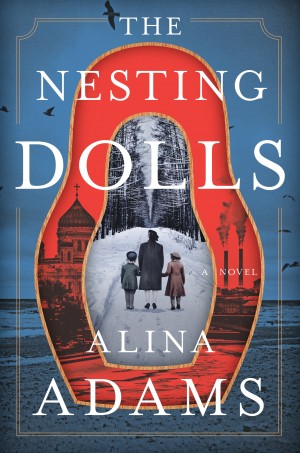Inspired by Neville Frankel’s personal family history, On the Sickle’s Edge is a multi-generational Jewish family saga, told through the voices of three compelling characters: the endearing, scrappy South-African born Lena, transported to Latvia and later trapped in the USSR; her granddaughter Darya, a true Communist believer whose growing disillusionment with Soviet ideology places her family at risk; and Steven, a painter from Boston who inadvertently stumbles into the complex web of his family’s past. On the Sickle’s Edge is a novel of assimilation, resilience, and cultural identity. An historical novel, political thriller, and love story, it is steeped in Russian history and Jewish heritage.

Fiction
On the Sickle’s Edge
May 16, 2017
Discussion Questions
Courtesy of Neville Frankel
- What is the effect of revealing the story through the narrative of multiple characters? Did you relate to one of the narrators more than others?
- Many of the characters suffer great losses. How do these losses impact their worldview and actions over the course of the story?
- To some extent, we are all shaped by the political and economic times in which we live. In what way do political, economic and social circumstances affect the lives and identity of the three principal characters in the book — Lena, Darya and Steven?
- A key theme is the secrets various characters keep. What are the consequences — for each individual, their descendants and loved ones — of keeping secrets? Of revealing them?
- How does the mysterious teapot become a metaphor for the secrets passed from one generation to another? What is Steven’s role in saving the teapot from destruction? Given his character, in what ways is that an appropriate role for him to play?
- Art and painting figure prominently in the story, especially in the lives of Lena, Vasily and Steven. How does art manifest itself as a saving grace in the lives of these characters? Are there times when art fails to provide them a refuge?
- This book has been called a “feminist novel” because of its many strong female characters. Do you agree? Why or why not?
- Lena says, “Boys want to grow up to be heroes. Girls want to grow up to be caregivers.” In what ways do the characters in the book adhere to or deviate from these gender roles? In your own life experience, is this true? How so?
- is sometimes regarded as a “coming of age story” in the case of the character, Steven Green. What events in the book push Steven to evolve? When he goes to Russia to rescue Darya and her children, what are the reasons that motivate him to act?
- On the Sickle’s Edge
- We learn a great deal from family letters in the book. Is this narrative device effective? Why or why not?
- Do you think Esther’s decision to change their family’s identity was a wise one? Why or why not?
- Why does Lena’s daughter, Klara, run away from home? Could this have been avoided? How does Lena’s experience with her daughter impact the way she raises her granddaughter Darya?
- Explore the interplay between Darya’s romantic relationships and her sense of self. Why is she initially attracted to Grigory Yanov? What drives her to finally see him for what he is? Why did she wait so long to leave Russia — and once safely in the U.S., why does Darya hesitate to pursue her romance with Steven?
- After emigrating to the U.S., Lena says she thinks “having too much freedom makes people sloppy.” What does she mean by that? Do you agree?
- What scenes were most vivid or moving for you?
- Several characters must make decisions that could put themselves or their loved ones at risk: Esther and Isaak concealing their family’s Jewish identity; Darya betraying her husband; Nikolai living as a gay man in the Soviet Union. What other examples did you notice? How would you have responded in their situation?
- Did the book give you a better understanding of life in 20th-century Russia and the Soviet Union? Life in late 19th century Latvia? In what ways?
- What will you remember most about ? Do any of the themes in the book have relevance today? Why or why not?

Jewish literature inspires, enriches, and educates the community.
Help support the Jewish Book Council.


